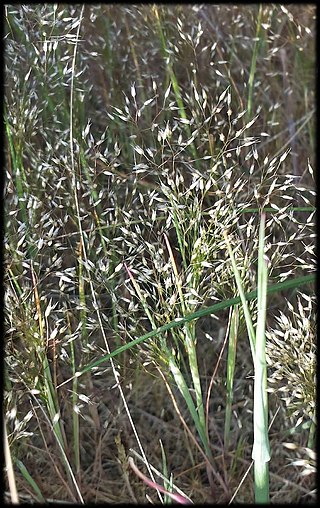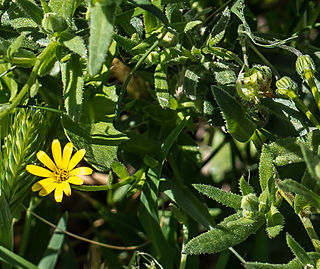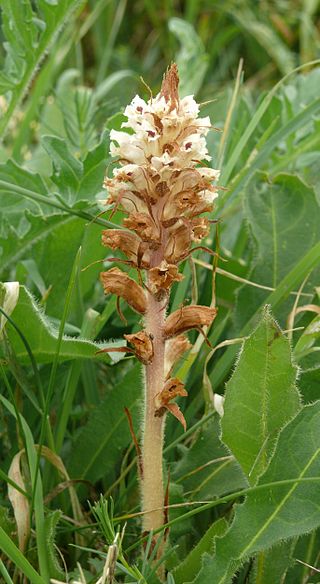
Rhubarb is the fleshy, edible stalks (petioles) of species and hybrids of Rheum in the family Polygonaceae, which are cooked and used for food. The plant is a herbaceous perennial that grows from short, thick rhizomes. Historically, different plants have been called "rhubarb" in English. The large, triangular leaves contain high levels of oxalic acid and anthrone glycosides, making them inedible. The small flowers are grouped in large compound leafy greenish-white to rose-red inflorescences.
Origanum × hybridum, synonym Origanum × pulchellum, is an ornamental plant of hybrid origin. Its two parents are O. dictamnus and O. sipyleum. It is known as the showy marjoram or the showy oregano.
Typical flora of Malta consist of the following plants. While small compared to other countries, the Maltese Islands contain flowers that grow on Malta, Gozo, Comino, Filfla, St Paul's Islands and Fungus Rock. Many of the species are endemic to Malta.

Trifolium hybridum, the alsike clover, is a species of flowering plant in the pea family Fabaceae. The stalked, pale pink or whitish flower head grows from the leaf axils, and the trifoliate leaves are unmarked. The plant is up to 40 centimetres (1.3 ft) tall, and is found in fields and on roadsides – it is also grown as fodder. It has been linked with toxicity in horses and has some agricultural uses. The plant blooms from spring to autumn. Originating in mainland Europe, it has become established as an introduced plant in the British Isles and throughout the temperate regions of the world.

Chenopodiastrum murale, is a species of plant in the family Amaranthaceae known by the common names nettle-leaved goosefoot, Australian-spinach, salt-green, and sowbane. This plant is native to Europe and parts of Asia and northern Africa, but it is widespread worldwide, particularly in tropical and subtropical areas due to the ease of it being introduced. It is a common weed of fields and roadsides.

Veratrum hybridum is a species of flowering plant in the Melanthiaceae known by the common names slender bunchflower and crisped bunchflower. Many publications use the synonyms Melanthium latifolium and Veratrum latifolium, but the "hybridum" epithet is 9 years older than the "latifolium," so Veratrum hybridum is now the accepted name.

Lamium hybridum, the cut-leaved dead-nettle, is a species of Lamium native to western and northern Europe and northwestern Africa. The specific name means 'hybrid'; however, Dominique Villars, in describing the species, did not give his reasons for selecting this name. The English name refers to the deeply cut leaves, unlike the shallower lobes of other related species of Lamium.

Papaver hybridum, the rough poppy or round pricklyhead poppy, is a widespread species of flowering plant in the family Papaveraceae. It is native to the Mediterranean region, and western Asia as far as the western Himalayas, and has been introduced to much of the rest of Europe, South Africa, all of Australia, some US states, Chile and Argentina. It is a minor weed of cereal crops, and its range is expected to greatly expand due to climate change.

Aira elegans is a species of plant in the Poaceae family. It is commonly known as Mediterranean hairgrass, elegant hairgrass and the annual silver hairgrass.

Andryala integrifolia, also known as common Andryala, is a species of flowering plant in the family Asteraceae.

Asparagus horridus is a species of shrub in the family Asparagaceae. They are climbing plants. They have simple, broad leaves and fleshy fruit. Individuals can grow to 1 m (3.3 ft) tall.
'Brachypodium distachyon', the purple false brome, is a species of annual grass in the family Poaceae. They have a self-supporting growth form and simple, broad leaves. Individuals can grow to 14 cm tall.

Calendula stellata is a species of annual flowering plant in the marigold genus Calendula, family Asteraceae. It is native to northwestern Africa, Malta, and Sicily. Flowering period is between January and April. Flowers are typically orange or yellow.
Sporobolus aculeatus is a species of plants in the family Poaceae.
Hypericum australe is a species of plant in the family Hypericaceae. Individuals can grow to 24 cm tall.

Misopates calycinum is a species of annual herb in the family Plantaginaceae. They have simple leaves.

Orobanche picridis-hieracioidis is a species of plant in the family Orobanchaceae.

Scorzonera laciniata, also known as cutleaf vipergrass, is a species of herb in the family Asteraceae.

Polypogon viridis, the beardless rabbitsfoot grass, is a species of perennial grass in the family Poaceae. They have a self-supporting growth form and simple, broad leaves. Individuals can grow to 0.43 m. They are native to southern Europe, Macaronesia, North and East Africa, and Asia.

Daucus pumilus is a species of plants in the carrot family Apiaceae.















